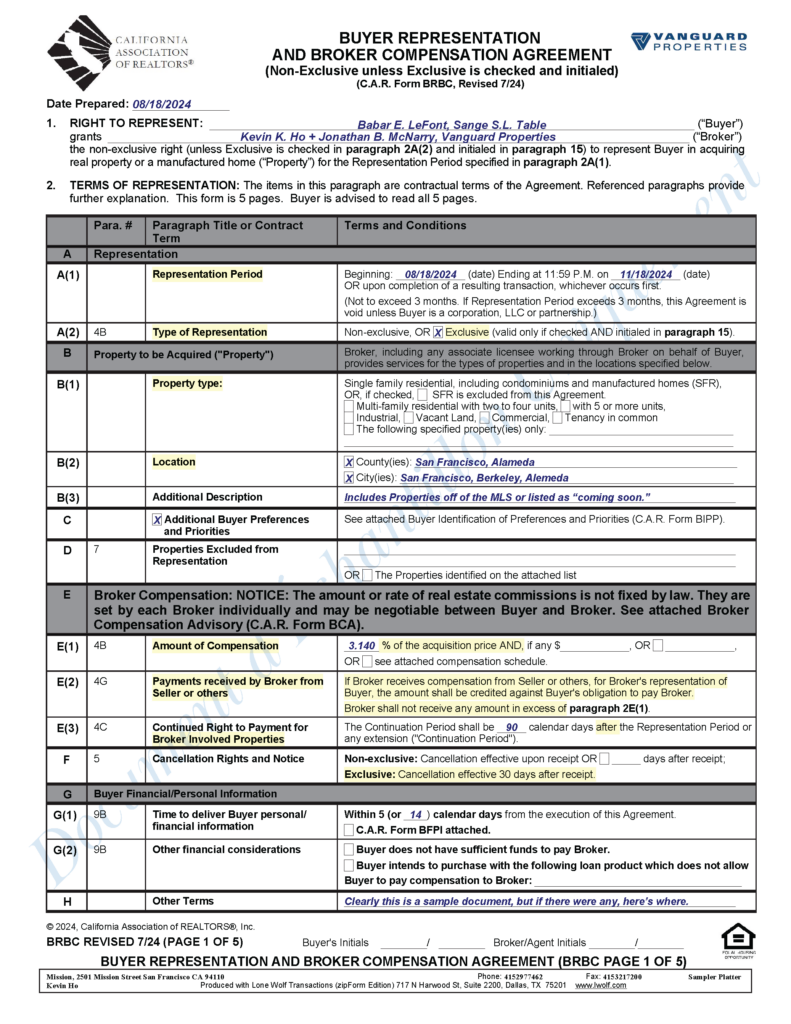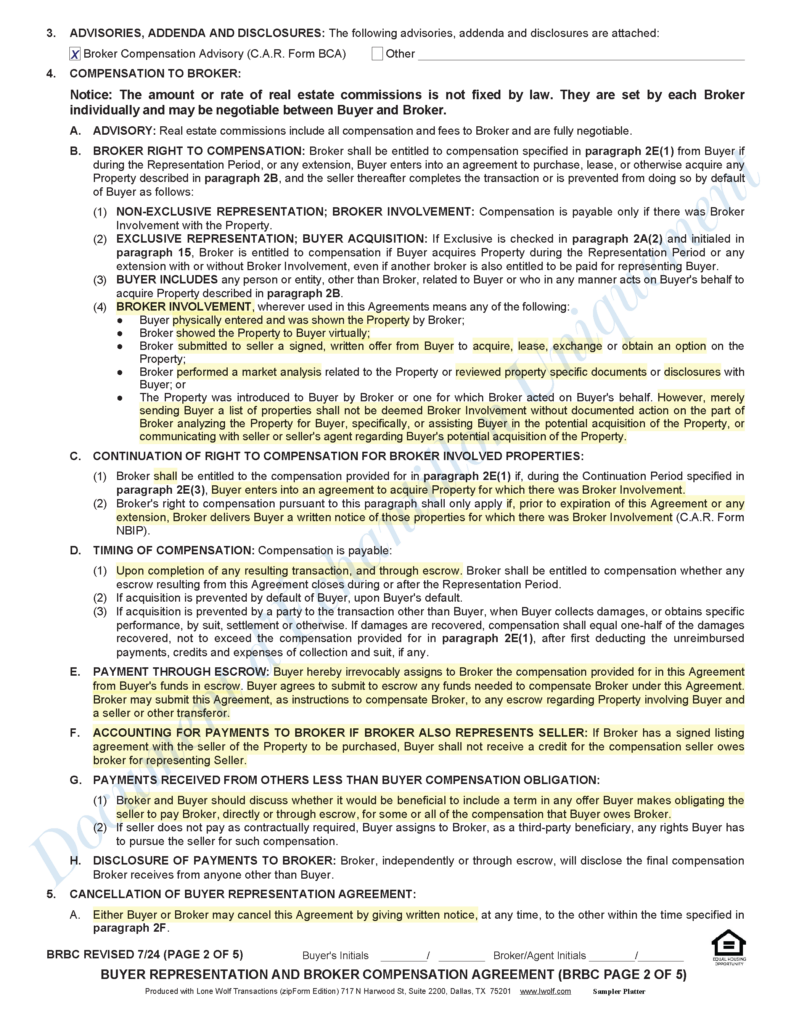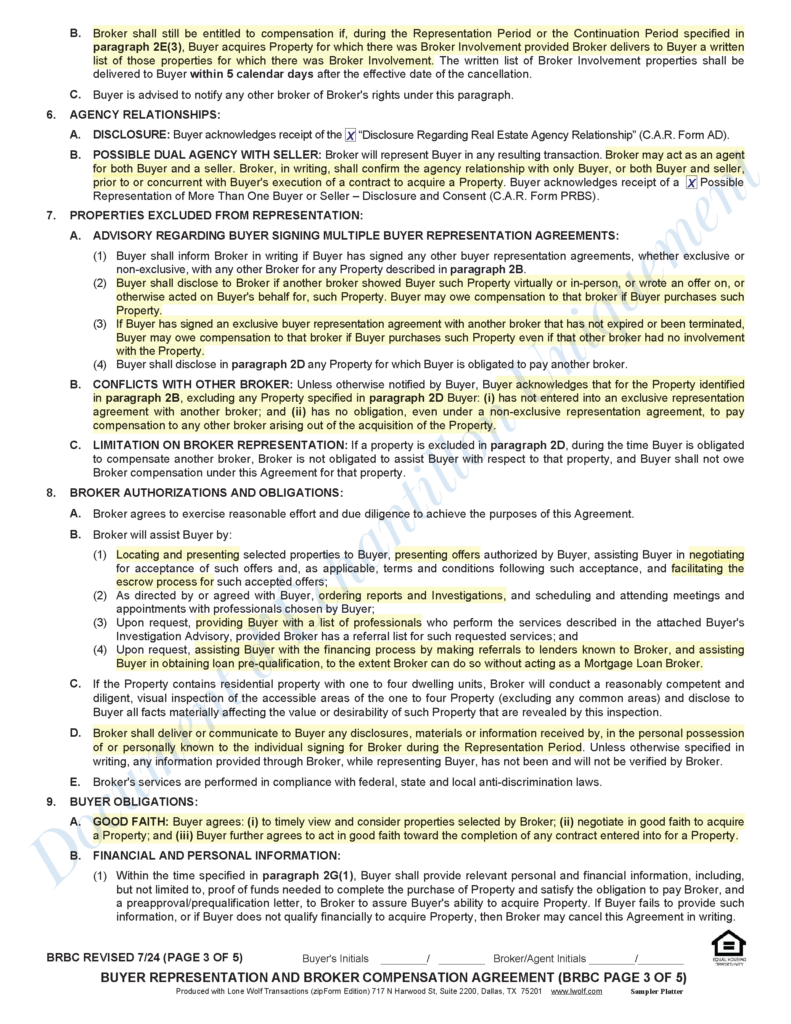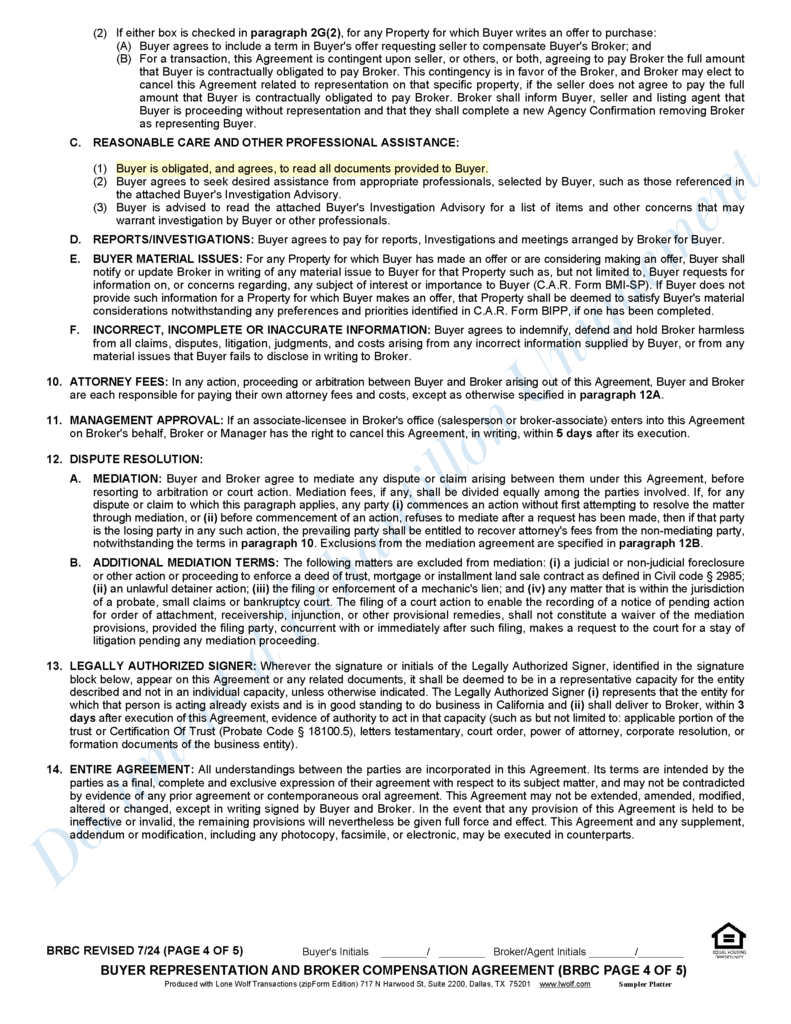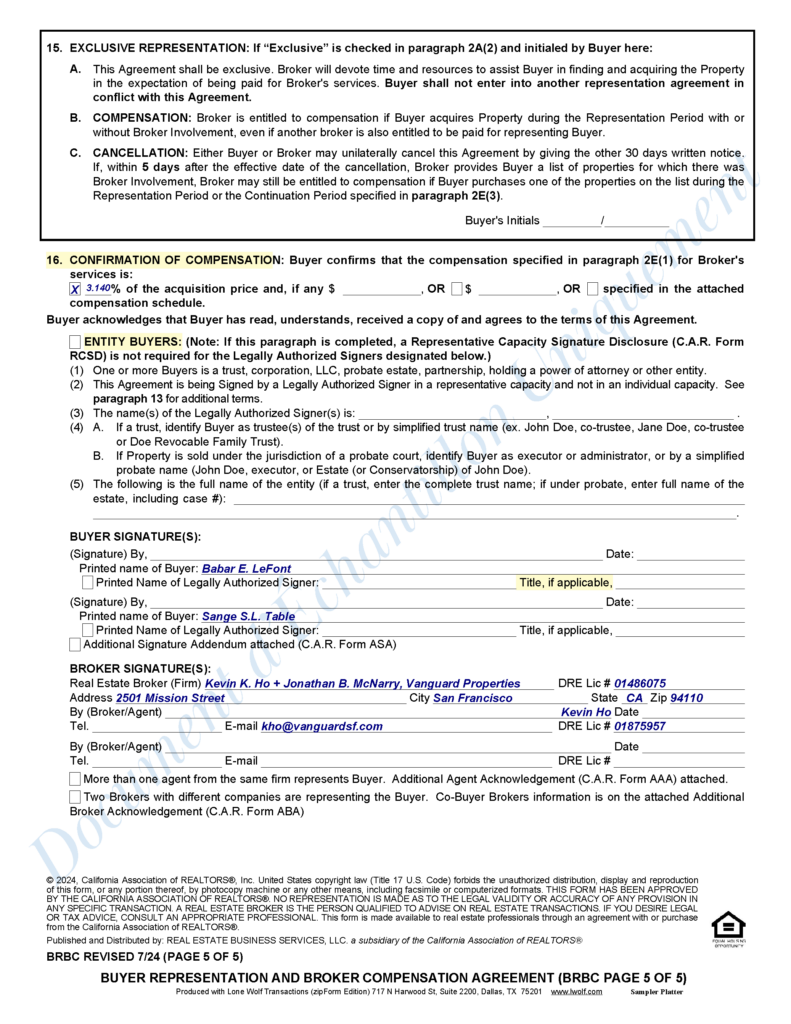New Real Estate Guidelines: Buyer Agreements & Commission Updates

You Must Have a Valid Buyer Agreement for a Specific Percentage (or amount)in Effect Before Submitting an Offer if You Want The Seller to Consider Crediting It
Buyers must now have a written agreement with their agent before making an offer on an MLS-listed property. Commission structures are no longer pre-set—buyer agent fees must be negotiated as part of each transaction.
Real estate got a transparency upgrade in 2024: Both buyers and sellers now need written agreements with their agents. This means buyer commission rates are negotiated upfront when buyers and their agents first start working together. Whether sellers cover buyer agent fees is decided with each purchase offer.
💡 What This Means for You:
• Sellers no longer automatically pay buyer agent fees—they must be requested in the offer (but most sellers agree).
• Buyers may need to cover their agent’s fees if sellers refuse concessions (but this may change qualifying cash vs mortgage ratios).
• Lenders generally do not finance buyer agent fees (but VA loans allow it).
WHAT YOU NEED TO KNOW
How It Works Now
The Bottom Line
While the system has changed, the fundamental market economics have remained the largely the same allowing buyers to maximize their cash funds without compromising loan-to-value. ratios (LTVs). Having agreements in place has lead to fuller discussions and transparency for all parties concerned.
How Were Buyer Agents Paid Before?
Previously, buyer agents were automatically paid from the seller’s proceeds—which were ultimately a combination of the buyer’s cash and lender funds. This amount was pre-set in the listing agreement, typically between 2.5%–3%, and was advertised on the MLS.
How Are Buyer Agent Fees Handled Now?
Now, buyer agent compensation must be negotiated for each transaction and included as part of the purchase offer. Additionally:
Buyers must have a written Buyer Representation Agreement in place before they can submit an offer or be shown properties listed on the MLS; in San Francisco that agreement accompanies the offer (although this may change) and escrow will review it before closing.
There are no pre-set commission amounts—fees are now openly discussed between buyers, sellers, and agents, but have largley remained consistent with past practice.
If sellers refuse to pay buyer agent fees, buyers must cover the cost themselves out of pocket or adjust their offer accordingly — usually downwards as this will impact Loan-to-Value ratios for buyers getting mortgages.
Why Would a Seller Still Cover Buyer Agent Fees?
Many sellers still agree to cover buyer agent fees for practical financial reasons, including:
✅ The Multiplier Effect – Buyers can use lender financing to put more toward the purchase price rather than depleting cash reserves on agent fees. This often results in a higher net for the seller.
✅ More Competitive Offers – In bidding wars, buyers with available cash can offer more, giving sellers a stronger final price.
✅ Encourages More Offers – If buyers must pay agent fees out-of-pocket, some may opt out of making an offer altogether, reducing seller demand.
✅ Smoother Transactions – Experienced buyer agents ensure better-prepared offers, reducing delays, misunderstandings, and post-close issues.
If a Buyer Pays Fees, and the Purchase Price is Lower, is There a Lower Property Tax Basis?
No. If a buyer pays their agent directly, the local tax assessor still includes that amount when determining the total purchase price. The Board of Equalization form completed at closing explicitly asks for:
“Total purchase price (include real estate commission if paid by buyer).”
In other words, paying out of pocket does not reduce property taxes.
What About Competitive, Probate Sales or Fixers?
You might think that in competitive bidding situations—like probate sales—sellers focus solely on their net proceeds. While that is often true, loan-to-value (LTV) ratios and cash-on-hand principles also play a critical role.
Probate buyers, especially those purchasing fixers, typically prefer to keep more cash available for renovations and repairs. A strong offer doesn’t just depend on price—it also depends on a buyer’s ability to finance and improve the property.
This is why many sellers still choose to cover buyer agent fees—it allows buyers to preserve their liquidity, making their offer stronger and more appealing while still helping sellers achieve the best possible outcome.
How Do Lenders View Buyer Agent Fees?
Lenders have always indirectly financed buyer agent fees since they were built into the final sale price. Most lenders still do not allow buyers to roll these fees into their loans separately.
VA loans now permit financing buyer agent fees, which could indicate future industry shifts. Still, widespread adoption across the lending industry remains unlikely. Implementing such a change would require major regulatory reforms, potentially even acts of Congress.
For a deeper dive into this issue, check out this insightful analysis:
🔗 The Myth of Financing Buyer Agent Commissions – HousingWire
VALUE ADDED
Yes, Buyer Agents are Worth it.
Aka, Why So Many Want to Work with Kevin+Jonathan – Respected, Proven, and Committed to Your Success
This is our site, so we get to toot our horns for a while — and it’s not bragging if it’s true, right?
We bring more than just real estate expertise to the table—our backgrounds as a lawyer (Kevin) and a nurse (Jonathan) give us a sharp eye for detail, strong advocacy skills, and a deep sense of care and responsibility. We’re also homeowners ourselves, having transformed our own stunning home from a fixer-upper we bought at a garage sale (yes, there’s a story there!).
🐶 Dog Dads & Real Estate Pros: Our beloved black lab, Raffi, has attended more open houses and closings than most agents.
🏡 Homeowners Who Understand Fixers & Design: We live what we preach—having turned a hidden gem into a dream home, we know what makes a property truly valuable.
🔍 Deep Market Knowledge: We analyze disclosures, market dynamics, and decision factors to ensure you make the smartest, most informed choices.
📚 Your Real Estate Encyclopedia: Think of us as your walking Wikipedia—if we don’t know the answer, we connect you with the right experts in our trusted network.
💡 Strategic Guidance: From navigating negotiations to uncovering hidden property insights, we help position you for success—even in competitive markets.
🏆 Proven Track Record: With hundreds of millions in sales, we don’t just talk the talk—we deliver, time and time again.
🤝 Respected in the Community: Our relationships with fellow agents, vendors, and industry professionals often make the difference in getting you the best opportunities.
We are your counselors, your cheerleaders, and your steadfast professionals—always ready to go the extra mile to ensure you achieve the best possible outcome.
IN SUM
Big Picture:

NOTHING IS A GIVEN
Autopay is Out.
Seller concessions covering buyer agent fees are likely to be requested—and in most cases, they’ve been accepted. If the price is right! 🎶 (Cue The Price is Right music.) Ultimately, it all comes down to the offer strength and net proceeds for the seller.

THE BIGGER PICTURE (Pt. 1)
Negotiation is In.
Just as every property is unique, so is every transaction—including how buyer agents are compensated. There’s no one-size-fits-all approach.
We will negotiate our fees on your behalf whenever possible while proving our value at every stage—to you, the seller, and everyone involved in the deal.

THE BIGGER PICTURE, Pt. 2
More Transparency.
One reason for this change was to increase clarity and give buyers and sellers more room to negotiate. But with home values continuing to rise, one thing remains undeniable—having skilled, professional representation on all sides is more essential than ever for success.
IN PRACTICE
Buyer Agreements

Just like sellers have always had formal agreements with their agents, buyers are now required to have the same at the start of their home search. Every real estate agent must now have a written agreement in place before working with a buyer, ensuring expectations are clear from the beginning.
Under these new rules, buyers must discuss agent fees upfront and can still request sellers to cover these costs as part of their offer. Importantly, this only applies if you actually close on a home—there’s no fee just for working with an agent.
This requirement applies to all real estate agents in California, not just REALTORS®. REALTORS® must have the agreement signed before showing properties, while other agents must do so as soon as practicable.
The takeaway? A great buyer agent is invaluable. The right agent protects your interests, negotiates strategically, and ensures you’re making the smartest investment possibl
A Form For Us and You
(only when you’re ready)
Just as doctors, mechanics, and dog groomers require written agreements before starting work, all real estate agents must now do the same. The agreement must list a commission rate, specific geographic area and last no longer than 3 months.
For years, only seller’s agents (listing agents) needed formal agreements. Now, all agents must have a written agreement in place before engaging with buyers. If you’re serious about purchasing, let’s take a look at what this means.
Here’s a sample buyer representation agreement we've completed, outlining how agents and buyers work together. This is California’s general form, but variations exist across brokerages, regional REALTOR® groups, and platforms like Zillow.
These agreements are designed to be flexible and tailored to individual clients, agents, and properties.
Take a look—we’ve highlighted key sections for you to review to make sure you’re informed and prepared for the next step.
ON THE GROUND
What to Expect

Open House Bouncers
(Or Just a Sign-In Sheet!)
Much like a nightclub bouncer, some listing agents may start checking if you have Buyer Representation paperwork in place before allowing entry to an open house. Others may simply require you to sign in before viewing the property.
We will set you up with the necessary paperwork ahead of time so you’re ready to go. If we haven’t yet, or if you’re attending an open house on your own, be sure to mention us to anyone who asks—this helps ensure your interests are protected and that agents know you’re working with experienced professionals.
Commitment Phobia
(Sign only when you’re ready)
Don’t let anyone pressure you into signing an exclusive buyer representation agreement too soon—including us. Choosing the right real estate agent is a big decision, and we want you to feel 100% confident that you have the best support, counsel, and expertise backing you.
If you’re not quite ready to commit, that’s okay! We don’t blame you for shopping around. That’s why you may see short-term, non-exclusive agreements available—allowing you to explore your options while still receiving professional guidance along the way.

Concession Friendly or Agnostic?
Even If a Seller Says No Concessions on the MLS, We Can—and Will—Still Ask (If Instructed)
Listing agents can now only indicate a seller’s “willingness” to consider offers with concessions on the MLS, using a simple yes/no format—no specific details allowed. The actual terms will always be negotiated later, regardless of what’s marked on the listing.
This aligns with the rule that prohibits specific compensation amounts from being published on the MLS. In fact, the listing agreement itself no longer includes a space for a buyer agent fee—because, at the time of listing, it doesn’t exist yet. Until an offer is made, it’s just an abstract concept, tied directly to the negotiation process and seller’s decision at that moment.
So even if an MLS entry says “no concessions”, that doesn’t mean we won’t ask and negotiate for them—because that’s exactly what we do.
Commitment Phobia: No Numbers Please
Part 2
The MLS no longer allows specific percentages or amounts of potential buyer agent compensation to be publicly listed. While you may still see signs or statements with numbers floating around, these are not technically allowed and shouldn’t be relied upon.
Even if a seller’s agent mentions that a seller is (or isn’t) willing to consider offers with a concession, there’s no guarantee—this must be negotiated on a case-by-case basis as part of the purchase offer. Always assume that buyer agent fees are subject to direct negotiation and should be addressed upfront in your discussions.
SOME NOTES
NOT THE LOOPHOLE YOU SEEK
If you’re a buyer thinking that paying your agent fees separately will lower your property’s future assessed value, think again.
At closing, title and escrow must report the total sale consideration (i.e., all money exchanged) to the relevant authorities—including any buyer-paid commissions. This means your property tax basis won’t be reduced, no matter how the fees are structured.
LATE 2024 UPDATE:
After the 2024 NAR settlement introduced written buyer-broker agreements and made commissions negotiable with each offer, the impact was moderate with 90%+ of sellers still covering buyer agent fees overall, with that number holding at 94% in the Bay Area, according to title company representatives.
EARLY 2025 UPDATE
In San Francisco proper, the vast majority of sellers continue to cover buyer agent fees. However, in competitive bidding situations, some buyers are agreeing to cover part or all of their fees, making seller net sheets more critical in evaluating offers.
WHY K+J
“Kevin and Jonathan are a fantastic team. I found them via Yelp and, for once, the superlative reviews were accurate.”
“Step by step they guided us through the process and advised us on how best to proceed. Most of all their encouragement is probably what kept us in the game that otherwise I thought we could not have won.”
“Thank you for bringing decency to an otherwise shoddy industry.”
“It’s hard to describe how good of an experience it was to work with Kevin and Jonathan — they’ve completely changed our opinion of how great real estate can be.”
“We had a wonderful experience working with Kevin, Jonathan, and Raffi. We have and will continue to recommend them to anyone who is looking to buy or sell a home in the Bay area. We were first-time buyers and because of their expertise and support, we’re able to get our dream first home!”
“If I could give more stars I would.”
“Having Kevin and Jonathan as guides through the SF real estate market is a true win. Their expertise and knowledge in navigating housing and neighborhood options, complex processes and paperwork is bar none.”
“They are so positive, energetic and fun, that the whole experience working with them is a joy! ”
You Have Questions? We Have Answers
Ask us about how the shift in buyer agent fees has changed our marketplace and what it means for agents to earn their keep.

HOW IT ALL STARTED
How did we get here?
It all started with a checkbox instead of a line
The New York Times tracked down the Missouri buyers who first filed one of many lawsuits that caused the national changes to what can appear on the various MLS databases across the country and who bears the responsibility of paying the buyer agent in each transaction. For them, according to the article, the offending trespass was that the standardized listing agreement their local realtors used only had checkboxes for how much they would pay the buyer’s agent (who was only an abstraction when they signed their listing agreement). There was no choice in the matter. No opportunity for them to decide something different. If that form had only done what California had done with its old form — having a blank line where you can write in a number or arrangement — we may have avoided all the upheaval.

